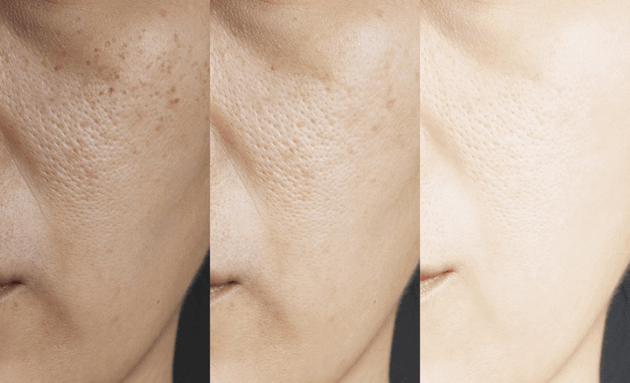Could Dark Patches On The Face Be Melasma?

Melasma, also known as hyperpigmentation, is a skin pigmentation disorder that causes discoloured skin patches. It appears tan, greyish or brown in colour, usually around the jawline, nose, or cheeks. Although Melasma does not cause any other medical conditions or physical discomfort, it can affect a person’s self-confidence. The good news - there are various treatment methods available for Melasma.
Who Is At Risk Of Melasma?
Melasma usually occurs in women and may be influenced by factors like exposure to the sun, hormones, and genetics. In India, 20-30% of 40-65-year-old women report facial melasma.
What Causes Melasma?

Melasma is mainly caused due to hormonal changes, especially after pregnancy, or if someone is on hormone replacement therapy or birth control pills. It can also be caused due to family history, anti-seizure medications, or excessive exposure to the sun.
Are Your Dark Patches Melasma Or Something Else?
The first sign of melasma is darker patches on your forehead, cheeks, temples, or upper lip. You will not feel any discomfort and there will be no soreness or pain in the dark patches.
However, other reasons for dark patches could be:
- Birthmarks
- Other skin pigmentation disorders
- Skin rashes or infections
- Skin cancer
- Undiagnosed or untreated diabetes
- Other medical conditions like lupus
If your dark patches don’t go, it is best to seek medical attention and find the actual cause of the dark patches on your skin.
Melasma and Pregnancy: What is The Link?

Melasma, also known as Chloasma or the “mask of pregnancy” - is caused due to a hormonal imbalance in women during their second and third trimesters of pregnancy.
Pregnant women have elevated levels of estrogen, progesterone, and melanocyte-stimulating hormones (MSH) that increase the levels of pigment deposits on the skin, making it appear darker in certain areas.
Another study suggests that pregnancy-related Melasma may be caused due to higher levels of progesterone in the body. Women receiving progesterone hormone replacement therapy have also shown to develop melasma.
How Can You Treat Melasma

Treatment is not always important for Melasma as it does not cause any damage. However, some people may opt for treatment methods like:
-
- Hydroquinone treatment in the form of cream/lotion/gel in dosage as prescribed
- Combined skin creams, depending on the type of Melasma and any other underlying medical conditions
- Medical procedures like microdermabrasion, laser treatment, or light therapy
A dermatologist will suggest the best treatment method for Melasma. Consult before opting for any over-the-counter medication.
How Can You Prevent Melasma?
If you have a predisposition to Melasma or have been diagnosed with Melasma, ensure you:
- Avoid excessive exposure to the sun
- Keep your skin covered when stepping outside
- Use sunscreen, hats, and sunglasses
With the right treatment combination for different skin types can aid in the gradual disappearance of dark patches on your face. Consult your dermatologist if you notice any pigmentation on your face.






